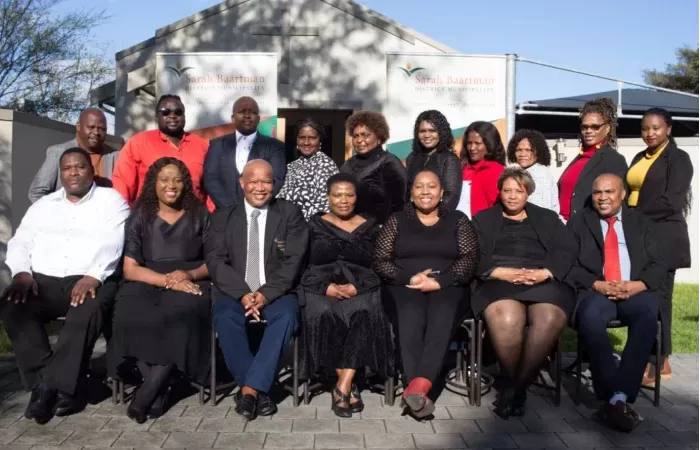
The Sarah Baartman District Municipality is one of 46 district municipalities in South Africa. Covering 34% of the entire Eastern Cape Province's geographical footprint, the Sarah Baartman District is the largest of the district municipalities in the Eastern Cape and wholly surrounds Nelson Mandela Bay. The Sarah Baartman District Municipality assists 7 local municipalities in providing the services needed by their communities.
The Municipality is headed by Executive Mayor, Clr Deon De Vos and Speaker, Clr Nomhle Gaga.
History
The Sarah Baartman District Municipality is situated in the western portion of the Eastern Cape Province. Although it completely surrounds Nelson Mandela Bay, the two areas are independent entities serving different communities.
A district municipality, as opposed to metropolitan and local municipalities, provides support to local municipalities within its area that are too small, poor or rural to provide all the services required by their communities.
The Sarah Baartman District Municipality capacitates 7 local municipalities, namely Kou-Kamma, Dr Beyers Naude, Kouga, Blue Crane Route, Sundays River Valley, Ndlambe and Makana. It supports the local municipalities with providing basic services like electricity, water and refuse removal.
The head office of the Sarah Baartman District Municipality is located in Govan Mbeki Avenue, Gqeberha.
The municipality has three departments, namely Finance and Corporate Services, Infrastructure Services and Economic Development Services. A significant amount of time and resources are spent on development, creating projects to grow skills, employment and initiate sustainable economic development as well as elevating the quality of life in the district.
The district covers approximately 58 242 square kilometres, while the people living in the Sarah Baartman District speak isiXhosa (49%), Afrikaans (45%) and English (6%) as their home language. The estimated population size is 479 923.
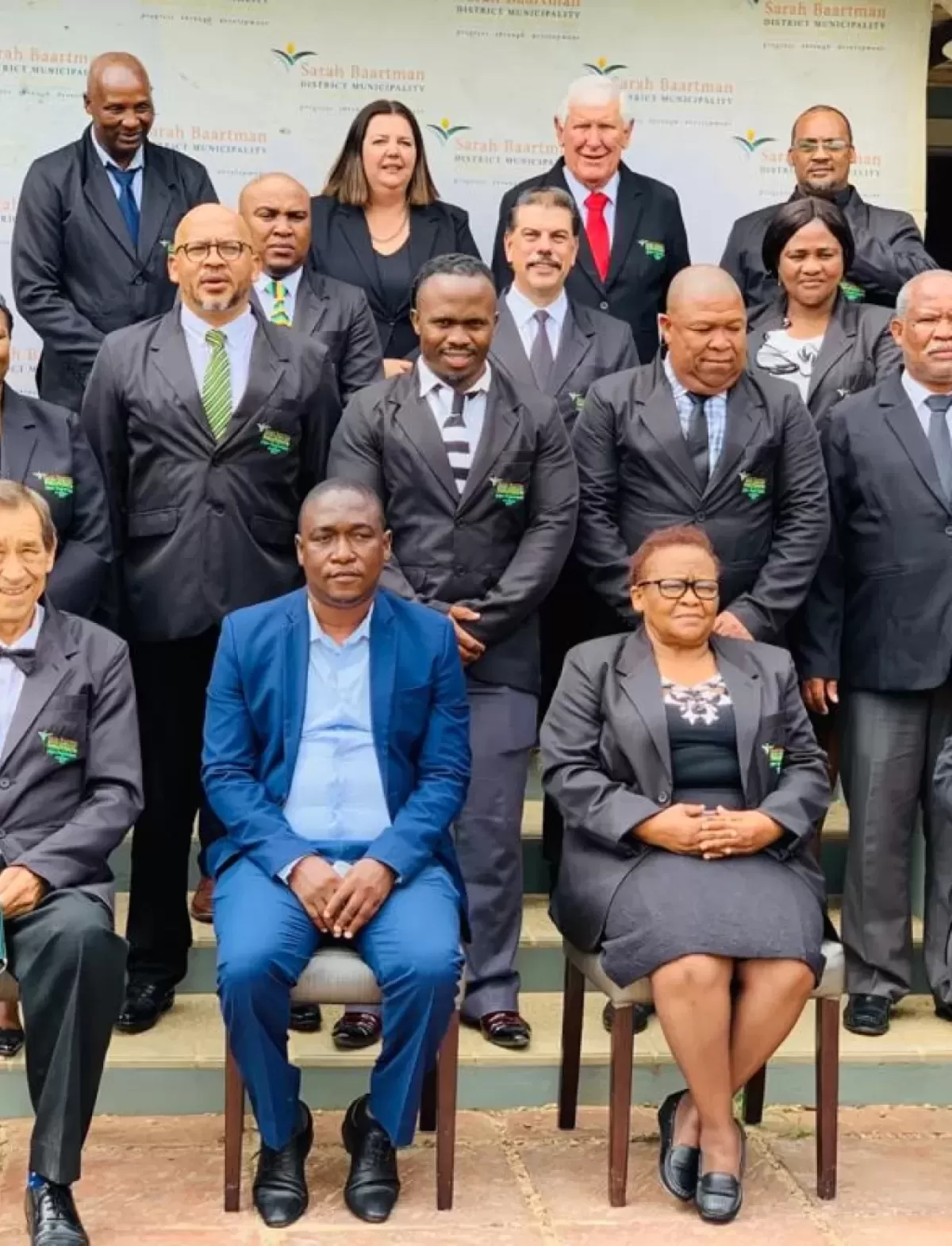
VISION
An innovative and dynamic municipality striving to improve the quality of life for all our communities.
MISSION
Coordinate, support and provide sustainable services and promote socio- economic development
In addition to the Batho Pele principles, our municipality commits itself to upholding the following set of values:
-
ACCOUNTABILITY - We are accountable for our actions
-
CREATIVITY - We promote new ideas to promote service delivery to our constituencies
-
EFFECTIVENESS & EFFICIENCY - We strive to do the right things timeously
-
SERVICE EXCELLENCE - We strive for service excellence and customer satisfaction
-
PROFESSIONALISM - We strive to maintain high professional standards
-
TRANSPARENCY - We are committed to openness and transparency in everything we do
Departments
Office of the Municipal Manager
The Municipality is headed by Executive Mayor, Cllr Deon De Vos and Speaker, Cllr Nomhle Gaga.
As the executive authority of the council, the Executive Mayor provides political guidance over the policy, budget and financial affairs of the municipality. The Office of the Executive Mayor also runs the portfolio for special programmes.
The Speaker is in charge of the legislative arm of the municipal council. This means that she guards the integrity of the legislative process and plays an important role in the 'oversight' that the council must exercise over the actions of the executive. She is also responsible to ensure that the municipality fulfills its public participation responsibilities.
The Office of the Municipal Manager is the driving force behind the Sarah Baartman District Municipality's administration and integrates all the different components of the municipality into its strategic and operational plans.
The Municipal Manager is ultimately responsible for the three departments; namely Finance and Corporate Services, Infrastructure Services and Economic Development.
The Municipal Manager of the Sarah Baartman District Municipality has direct responsibility for the following areas:
Capacity building;
Special programmes (youth, gender & disabled);
Intergovernmental relations; and
Performance management.
Municipal Manager: Ms Unati DanielsSpecial Programmes and HIV & AIDS Portfolio: Cllr Simphiwe Rune
Finance and Corporate Services
Easily referred to as the 'backbone' of any municipality, the Department of Finance and Corporate Services ensures efficient and effective financial and administrative operations.As the advisor on financial management issues in the Sarah Baartman District, the department is responsible for fiscal discipline, enhancing the quality of expenditure, allocating financial resources and improving overall financial governance in the Sarah Baartman District.The department also plays a key role in promoting shared growth and development in the district and works towards achieving socio-economic equity through more responsive budgeting processes, encouraging value for money spending and protects and promotes effective utilisation of the municipality's assets.The strategic objectives of the department are to: Ensure long-term financial sustainability; Promote good financial management practice; Provide financial advise to council; Ensure full compliance with all accounting statutory and legal requirements including implementation of the MFMA; Implement revenue generating strategies; Information Technology – most of the system and hardware is owned by the municipality with support from external services. Recover outstanding monies owed by Provincial Government in respect of health subsidies and long term liabilities; and Provide support to nine local municipalities. Functions of the corporate services division include: Human Resources - a specialized function which provides support services for other managers in the institution. Public Relations - providing information to public and staff, planning events such as community meetings and project launches, promotion and management of corporate identity and public image, formulating and maintaining a Communication Strategy, Stakeholder Management, speech writing on behalf of Mayor and Speaker to present at Council Meetings and other events. Other Services - Secretarial / Auxiliary Services, Archives & Central Registry, Property Management. Director of Finance and Corporate Services: Kaashifa AbrahamsFinance Services Portfolio Councillor: Charlene Booysen Corporate Services & Local Municipalities Performance Portfolio Councillor: Phindile Faxi
Economic Development and Planning
The economic development approach of the Sarah Baartman District Municipality, termed SEEDS (Socio-Economic and Enterprise Development Strategy) is structured around seven core strategies based both on a review of international trends in rural regeneration strategies as well as a reflection on the experience of the District Municipality and other institutions in promoting development in the region.
These seven strategies are briefly outlined below:
a) Increasing agricultural income
Agriculture remains the single most important economic driver in the district. The starting point for rural development is to find ways of increasing agricultural income. This is of course firstly a product of the drive of farmers individually and collectively. However, there are a number of ways in which farmers can be supported to increase the value of agricultural output. These include:
Growing national and international markets for agricultural output.
Facilitating investments in local and regional agro-processing plant to increase product demand and improve prices.
Investing in research and knowledge sharing to improve the quality and resilience of crops and livestock.
Supporting local and regional food systems that keep wealth in rural communities.
b) Investing in natural capital
There is an increasing recognition internationally and within South Africa that it is important to invest in protecting and restoring natural resources and ecosystems such as catchments, wetlands, rivers, forests and other natural areas to preserve bio-diversity, to ensure sustainable water supplies as well as to exploit the economic potential of such areas. The growth of tourism in the region is strongly associated with the exceptional and diverse natural assets. Key approaches to this include:
Promoting and incentivizing natural resource restoration and conservation including alien vegetation clearing, developing eco-systems markets that reward land restoration through carbon credit mechanism and so on.
Creating new generation green jobs and local income streams rooted in renewable energy.
Growing the rural tourism economy based on natural capital through agriculture-, adventure- and eco-tourism initiatives.
c) Broadening economic participation
Inequality and poverty are deeply entrenched with rural South Africa and represent a major constraint to development. However, the poor of the region also represent a major resource for economic progress. Broadening economic participation as part of a broader social development emphasis is thus a key pillar for rural regeneration. Key areas of action include:
Promoting BBBEE, SMME and cooperative development.
Maximising the opportunities for Extended Public Works Programme (EPWP) and Community Work programme opportunities.
Improving grant accessibility.
Establishing community-based beneficiation projects.
Facilitating community and worker participation in share ownership.
Promoting social development investments.
d) Developing the skills base
The skills base of the region is a key driver of both economic progress and poverty reduction. The skills profile of the Sarah Baartman District Municipality is very skewed. It is a region with a significant pool of highly skilled people. However, most people have limited skills and limited educational attainment. This is both a major constraint to development but also represents a significant area of opportunity given the wide range of good educational institutions in the region. The Sarah Baartman District Municipality is committed to a concerted approach to improving the skills profile of the region. Key areas of action include:
Improving the quality and quantity of school education and early childhood development (ECD) through partnerships.
Creating further education opportunities linked to work opportunities in the region.
Developing skills transfer partnerships between established and emerging farmers and between established and emerging businesses.
e) Improving connectivity and utility infrastructure
Transport, water and energy infrastructure are major challenges in an arid low-density rural area such as the Sarah Baartman District. The costs of such infrastructure are particularly high in such areas given distance and the area enjoys relatively low priority for infrastructure given its small population. It is therefore necessary to be innovative and focused in ensuring that sufficient infrastructure is in place to support development. Key areas here include:
Developing rural broadband and mobile phone connectivity is a key rural development strategy globally.
Improving rural transport infrastructure particularly roads.
Identifying and delivering catalytic infrastructure that opens up new economic opportunities.
f) Regenarating core towns
The core towns within a rural region play a critical role in the economy of the region as a whole. They are the economic and services hub that enable the rural economy to function. When towns decline, the rural hinterland tends to decline given the symbiotic relationship between them. The regeneration of core towns is thus a critical driver of rural economic development. Key areas of action include:
Urban regeneration projects focused on upgrading town CBDs and historic districts.
Ensuring quality education and health services in core towns in order to retain talent and skills in the area.
Promote tourism and niche services and manufacturing based on identifying competitive advantages and niche opportunities.
Ensuring that municipal infrastructure is maintained and upgraded on a financially sustainable basis in order to support growth and development.
Service delivery improvement partnerships to ensure that essential administrative and regulatory functions are undertaken by the Local Municipality.
g) Building local and regional networks
Research globally suggests that the quantity and quality of networks within a region and between the region and relevant role-players outside the region is a key factor influencing economic development. A key element of any strategy for rural regeneration is thus about finding ways to expand the networks and linkages between stakeholders in the region and connecting the region into relevant provincial, national and international processes. Areas of focus include:
Strengthening government to government connections at a regional, provincial and national level.
Building partnerships to improve economic competiveness and resilience.
Creating a positive image of the region amongst public and private investors and building relationships with them.
This Department is led by the Director of PED: Mr Duma Magxwalisa
The Portfolio Councillor for this Department is Cllr. N. Koba
Infrastructure Development & Community Services
The South African Constitution assigns municipalities the duty of ensuring the provision of basic services; promoting social and economic development and a safe and healthy environment in which to live and work. Therefore, the Department of Infrastructure Services and Planning plays a key role in the delivery of infrastructure services throughout the Sarah Baartman District.The District municipality does not provide services in respect of water, roads, waste management and electricity in the District. The local municipalities deal with service delivery, with the District Municipality providing funding for capital projects in order to implement infrastructure related services.Some examples are of services implemented as a result of the provision of adequate funding includes:
Rainwater harvesting in Pearston.
Stormwater drainage in Blue Crane Route Municipality.
Electricity Master Plans to enable local municipalities to access funding for electrification in their areas.
Undertaking Community Based Planning (CBP) within the Blue Crane Route Local Municipality which strengthened public participation and the IDP review process in that municipality.
Completion of the draft Area Based Plan / Land Availability Audit for the Sarah Baartman District.
Development of Electronic land use management system to assist Local Municipalities in performing their land use management function.
Feasibility studies of many other infrastructure projects.
General town planning support is provided to Local Municipalities. Furthermore, the Sarah Baartman District Municipality has entered into an agreement with the Baviaans Local Municipality and the Makana Local Municipality to officially assist those municipalities with the processing of land use management applications.Other functions of the Department include:SANITATIONThe sanitation function of the municipality is administered by the Department of Infrastructure Services and Planning. The strategic objective of this function is to capacitate local municipalities to provide every household with a basic level of service.Annual performance as per key performance indicators in sanitation services
No
Indicator name
Total number of household/customer expected to benefit
Previous years achievement level
1
Percentage of households with access to sanitation services
100%
100%
2
Percentage of indigent households with access to free basic sanitation services
100%
100%
COMMUNITY SERVICESSince 2006, the Department delivered the following community services:
Construction of two new libraries (at Fingo Village, Grahamstown, and Jansenville).
Provided new cemeteries in Makana, Sundays River Valley and Camdeboo local municipalities and in the towns of Somerset East, Waaikraal, Glenconnor, Kleinpoort and Vondeling.
Completion of Humansdorp sports facility Phase 2 in Kouga.
Completion of Steytlerville sports facility in Baviaans.
The Department of Infrastructure Development and Community Services of the Sarah Baartman District Municipality has also undertaken a number of upliftment projects, including:Fire and Hazmat awareness project at schools in 2011During the 2010/11 Financial Year, the Sarah Baartman District Municipality installed fire extinguishers at a number of schools in the District. In addition, the Department launched an educational programme informing learners and teachers about:
Basic fire prevention and the use of fire extinguishers.
Harmful chemicals and the dangers of commonly found households materials.
During the project, a total of 73 schools were visited, while 6344 learners and 251 educators were informed about these possible hazards.The Department also undertook conducted fire fighter training, Hazmat awareness and level 3 First Aid training of 28 local volunteers; purchased 3 Hazmat trailers and equipment for Blue Crane Route, Camdeboo and Kouga Local Municipalities at the cost of R1 million; purchased firefighting equipment in support of the 6 Fire Protections Associations located throughout the District; and purchased new fire trucks for Ikwezi, Blue Crane Route and Ndlambe Local Municipalities at the cost of R1.5 million and firefighting equipment to the value of R500 000.Restoration of fire hydrantsThe Department recently identified the need to restore a significant number of fire hydrants, located within Local Municipalities throughout the District. The aim of the project was to reduce fire risk and ensure availability of adequate water supplies in the event of a fire. In addition, the project focused on transferring the necessary skills needed for restoring hydrants to members of the local communities. This project involved the painting, marking and testing of fire hydrants in Local Municipalities, amongst other things.Rainwater harvestingThe recent drought conditions in the Eastern Cape necessitated the need to relook the storage of water meant for human consumption. As such, the Sarah Baartman District Municipality provided water tanks to all the settlements in the District in order to augment the existing bulk water supply. With the installation of these tanks, Local Municipalities such as Ikwezi were able to provide water to the towns of Jansenville and Klipplaat, while Ndlambe Local Municipality could provide water for the towns of Alexandria, Bathurst and Port Alfred. The District Municipality recently installed 1000 tanks in Pearston, and will shortly install another 1000 in Paterson. These community based projects all employ residential volunteers in order to further benefit the local communities.Job creationThe need to upgrade the roads and stormwater infrastructure of Rietbron Township has been identified, leading to an amount of R6 million being made available through the Municipal Infrastructure Grant (MIG) in order to implement this project over a 3 year period.The aim is to create employment opportunities and transfer skills to the local labour pool and small contractors through this Public Works Programme. Ultimately, a brick paving manufacturing plant will be established and local residents trained in the required skills in order to lay the 33 600m2 of paved internal streets in Rietbron. The project has been registered with the Department of Roads and Public Works. In support of the project, the Department has procured the small tools and protective clothing necessary for phase 1 to commence.In the 2010/11 financial year, the Sarah Baartman District Municipality budgeted for an amount of R 600,000 with which to purchase the brick-making machine, while a further R2 million has been provided for the implementation of Phase 1, which entails the upgrade of 3 roads.The construction progress as at 18 April 2011 was as follows:
Road 3 - 85% complete.
Road 5 - 35% complete.
Road 7 - 65% complete.
By the end of March 2011, 47 people were employed and accommodated on the municipality’s payroll. In addition, 31 people were trained in the basics of health & safety and risk assessment.Community Food GardensA number of community food gardens were initiated and funded by the Department in order to positively contribute to improving the nutritional food sources of these communities. The project involved the procurement and delivery of garden implements, seeds and equipment for 14 gardens to be established in Ikwezi and Baviaans Local Municipalities as well as the area previously known as the District Management Area.Director of Infrastructure Development Community Services: Ms Olwethu KwababanaPortfolio Councillor: Athenkosi Diniso
Disaster Management
SARAH BAARTMAN DISTRICT MUNICIPALITY DISASTER MANAGEMENT CONTACT DETAILS:
Telephone number: 041 508 7048
Toll free number: 0800 22 2238
RELIEF PARTNERS
INFORMATION
council
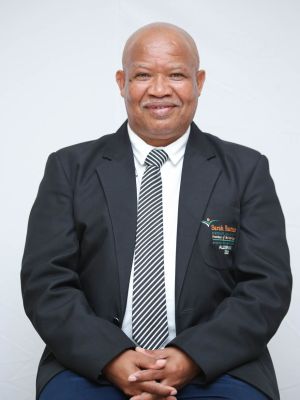
Cllr. Deon De Vos
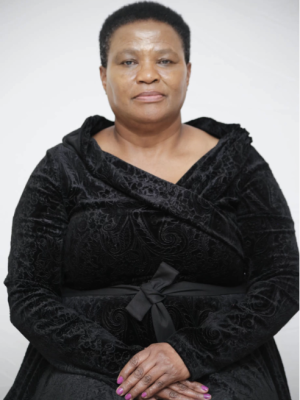
Cllr. Nomhle Gaga

Cllr. Athenkosi Diniso

Cllr. Simphiwe Rune

Cllr. Phindile Faxi

Cllr. Nomalungelo Koba

Cllr. Charlene Booysen

Cllr. Phandulwazi Sonkwala

Cllr. Phumlani Khungwayo

Cllr. Reinhardt Foley

Cllr. Richard Krige
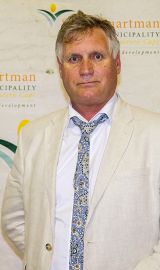
Cllr. Rory Gailey

Cllr. Zodwa Cetu

Cllr. Adriaan van Heerden

Cllr. Daniel Johannes Bezuidenhout
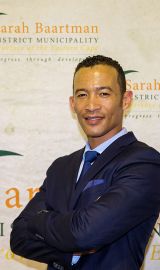
Cllr. Joerhan Mey

Cllr. Joseph Britz
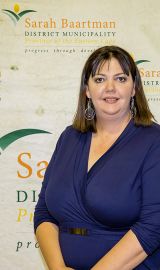
Cllr. Karen Smith

Cllr. Margaret Valgee

Cllr. Nomathamsanqa Sikiwe

Cllr. Nombasa Langbooi
